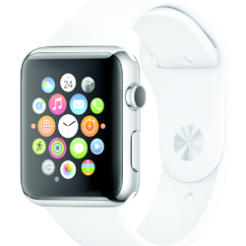Apple is launching its latest product on the anniversary of the Battle of Hastings. John Tate wonders if it will drive a comparable degree of change in the UK.
The one year I remember from my history lessons at school is, of course, 1066. Other dates I’m afraid are far too much of a blur.
On 24 April 1066 an English monk predicted that this country would be destroyed following the appearance of Halley’s Comet a month earlier. Sure enough, the Battle of Hastings followed. Harold was defeated and William the Conqueror became the first Norman king of England.
Step forward to 2015 and there is another epoch-making event scheduled for 24 April this year.
More new technology
You will be hearing a lot about it in the next couple of weeks as the 24th of this month is when the first Apple Watch will go on sale in the company’s UK stores. Will this launch change our country fundamentally, as the Battle of Hastings did all those years ago?
Well, Apple is the largest company in the world by market capitalisation and so is also the largest technology company. It has an estimated 600 million-plus users of its products – not far off one-in-ten people on the whole planet – so this launch has the potential to affect a lot of lives.
Apple says its smartwatch “represents a new chapter in the relationship people have with technology. It’s the most personal product we’ve ever made, because it’s the first one designed to be worn”. Key features include an “incredibly precise timepiece” with “entirely new ways to stay in touch” and a “smarter way to look at fitness”.
It is also quite large and expensive, and based on a reasonable level of use it will need to be recharged at least once a day. Prices start at £299 for the basic product and go up to between £8,000 and £13,500 for a version with a gold case. Rumours are circulating that one million units are planned for production of this top-of-the-range model alone, every month.
To help you prepare for this moment you will be allowed to try on the watch from 10 April in an Apple outlet, and from this date be allowed to pre-order the device.
We should remember that the wristwatch itself has been around since the 17th century. Wristwatch calculators were first seen in the 1970s, and the first watch incorporating television came out in the early 1980s. This has been followed by wristwatch cameras and, of course, a wide range of sporting and health devices.
As an accountant with over 30 years’ experience of technology in the workplace, I look at IT as a business tool. I resist any investment where there is not a clear business case.
I get frustrated with the hype surrounding new products and I get very steamed up about how customers will launch into a new IT project without the care and attention they would put into other change-management programmes.
So with Apple’s latest development I will ask questions like ‘do we really want to be able to check our emails 90 times a day on a device carried on our wrist?’ Or suggest that a smartphone can deliver nearly all the features that a smartwatch offers, so why have both devices?
IT as a fashion decision
But that ignores the fashion element of IT – and the extent that this influences buying decisions. The top 2015 technology fashions in the commercial world have been the cloud, mobile devices and big data.
How much are investments in these ‘solutions’ down to a solid business case, or can many of these purchasing decisions be explained by managers wanting to keep up with the ‘latest and greatest’?
From a hard-nosed business perspective I would question the real benefits of the Apple Watch. However, with an eye to fashion, I can appreciate that it might be the best-looking and most hip device coming to market this year.
Maybe the Apple Watch will be the product which finally encourages us to apply a back-to-basics approach to our IT investment decisions.
Just imagine a world where IT projects run on time and to budget. As unlikely as this is to happen in reality, I could definitely put the case that this would drive more change in our country than that battle of 1066.
John Tate is a business consultant, and a visiting lecturer at Cass Business School.








